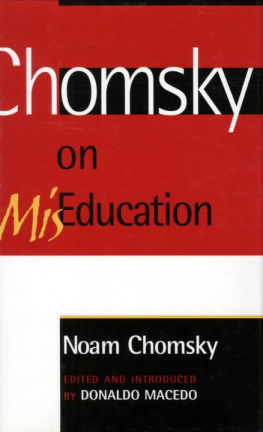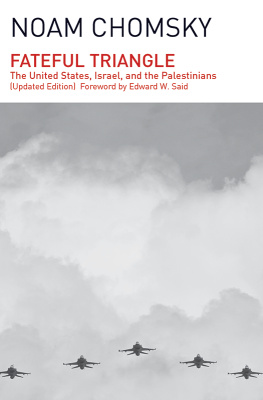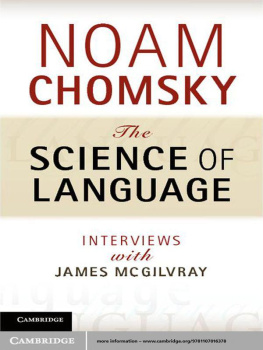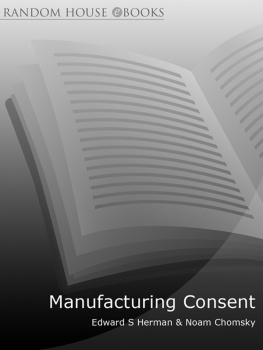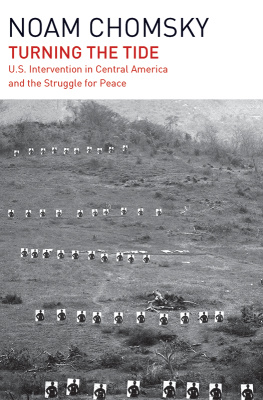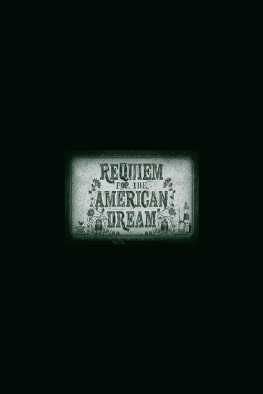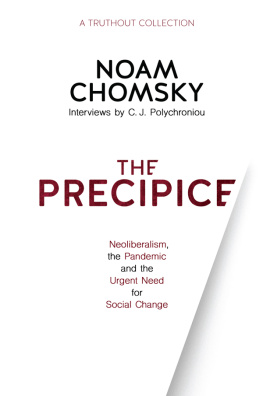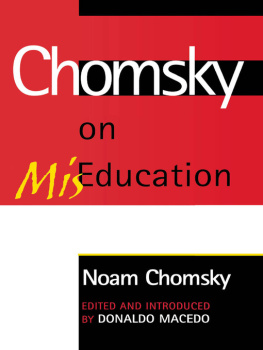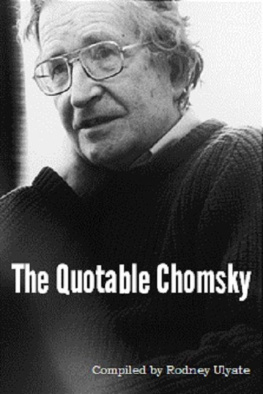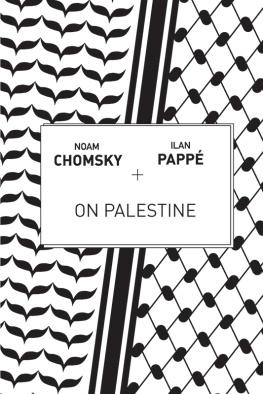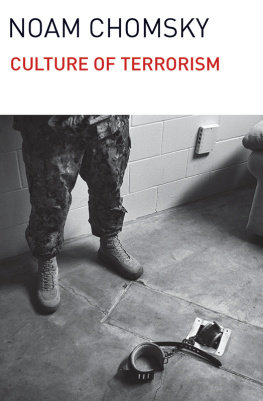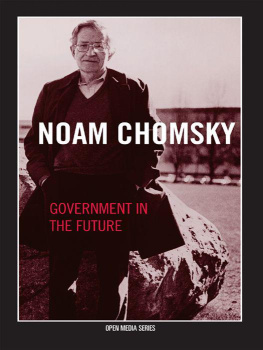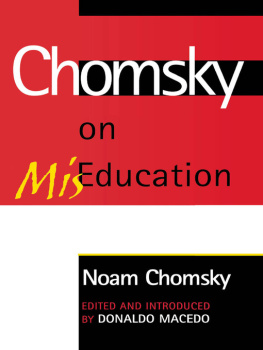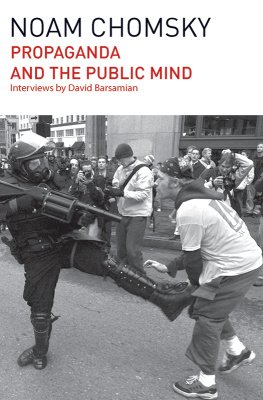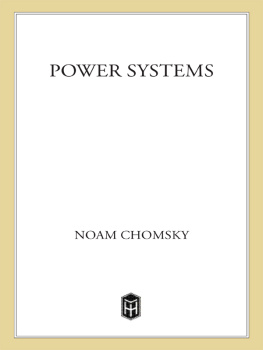Noam Chomsky - Chomsky on Mis-Education
Here you can read online Noam Chomsky - Chomsky on Mis-Education full text of the book (entire story) in english for free. Download pdf and epub, get meaning, cover and reviews about this ebook. year: 2004, publisher: Rowman & Littlefield Publishers, genre: Politics. Description of the work, (preface) as well as reviews are available. Best literature library LitArk.com created for fans of good reading and offers a wide selection of genres:
Romance novel
Science fiction
Adventure
Detective
Science
History
Home and family
Prose
Art
Politics
Computer
Non-fiction
Religion
Business
Children
Humor
Choose a favorite category and find really read worthwhile books. Enjoy immersion in the world of imagination, feel the emotions of the characters or learn something new for yourself, make an fascinating discovery.
- Book:Chomsky on Mis-Education
- Author:
- Publisher:Rowman & Littlefield Publishers
- Genre:
- Year:2004
- Rating:5 / 5
- Favourites:Add to favourites
- Your mark:
- 100
- 1
- 2
- 3
- 4
- 5
Chomsky on Mis-Education: summary, description and annotation
We offer to read an annotation, description, summary or preface (depends on what the author of the book "Chomsky on Mis-Education" wrote himself). If you haven't found the necessary information about the book — write in the comments, we will try to find it.
Chomsky on Mis-Education — read online for free the complete book (whole text) full work
Below is the text of the book, divided by pages. System saving the place of the last page read, allows you to conveniently read the book "Chomsky on Mis-Education" online for free, without having to search again every time where you left off. Put a bookmark, and you can go to the page where you finished reading at any time.
Font size:
Interval:
Bookmark:

Series Editor: Donaldo Macedo, University of Massachusetts, Boston
A book series dedicated to Paulo Freire
Critical Education in the New Information Age
by Manual Castells, Ramon Flecha, Paulo Freire, Henry A. Giroux, Donaldo Macedo, and Paul Wills
Critical Ethnicity: Countering the Waves of Identity Politics
edited by Robert H. Tai and Mary L. Kenyatta
Debatable Diversity: Critical Dialogues on Change in American Universities
by Raymond V. Padilla and Miguel Montiel
Imagining Teachers: Rethinking Gender Dynamics in the Classroom
by Gustavo E. Fischman
Immigrant Voices: In Search of Education Equity
edited by Enrique (Henry) Trueba and Lilia I. Bartolome
Latinos Unidos: From Cultural Diversity to the Politics of Solidarity
by Enrique (Henry) Trueba
Pedagogy of Freedom: Ethics, Democracy, and Civic Courage
by Paulo Freire
Pedagogy, Symbolic Control, and Identity, revised edition,
by Basil Bernstein
A Sanctuary of Their Own: Intellectual Refugees in the Academy
by Raphael Sassower
Forthcoming
Ideology Matters
by Paulo Freire and Donaldo Macedo
Paulo Freire and the Social Imagination: From Dreams to Praxis
by Maxine Greene
MisEducation
NOAM CHOMSKY
Edited and Introduced by Donaldo Macedo
1)onaldo Macedo
Democracy has failed because so many people fear it. They believe that wealth and happiness are so limited that a world full of intelligent, healthy and free people is impossible, if not undesirable.... Such a world, with all its contradictions can be saved, can yet be born again; but not out of capital, interest, property and gold.
-W. E. B. I)u Bois'
Schools in the so-called open and free societies face formidable paradoxical tensions. On the one hand, they are charged with the responsibility of teaching the virtues of democracy, and, on the other hand, they are complicit with the inherent hypocrisy of contemporary democracies, where, according to Noam Chomsky, the term democracy "refers to a system of government in which elite elements based in the business community control the state by virtue of their dominance of the private society, while the population observes quietly. So understood, democracy is a system of elite decision and public ratification, as in the United States itself. Correspondingly, popular involvement in the formation of public policy is considered a serious threat."2
Thus, the popular movements during the sixties and seventies that mobilized to question the criminal involvement of the United States in the Vietnam War and to demand civil rights guarantees and protection of the environment represented a real threat for the dominant ruling class. In the United States, the dominant sector of the society responded by creating the Trilateral Commission with the goal of finding ways to contain the general democratic participation of masses of people in the Western world in questioning their governments' unethical behavior. In so doing, the Trilateral Commission dropped all pretensions concerning schools as democratic sites charged with the teaching of democratic values. The Trilateral Commission, whose members-among them the former president Jimmy Carter-belonged to the international and essentially liberal elite, resolved the paradoxical tensions of "democratic" schools by declaring them as institutions responsible for the indoctrination of the young.' This led Chomsky to argue that the Trilateral Commission viewed schools as institutions for indoctrination, "for imposing obedience, for blocking the possibility of independent thought, and [that] they play an institutional role in a system of control and coercion."'
In tandem with the Trilateral Commission's goal of seeking ways to maintain Western capitalism's cultural hegemony, a plethora of cultural commissars emerged (largely funded by conservative foundations and think tanks). Their mission was to contain what they viewed as an "excess of democracy" and blame "those who would [seek to] democratize institutions, who would change relations of power" for the "social catastrophe" of the sixties.' Thus, it became necessary to frontally attack the experiments in democracy that questioned the unethical (and sometimes criminal) behaviors of governments and squarely put the blame on the "great society programs not only for financial losses but also for the drop in high school test scores, drug problems and a generation of children and youth with no fathers, no faith and no dreams other than the lure of the streets."6
Whereas the ruling class makes no apologies for the undemocratic role of schools, cultural middle management composed of teachers, professionals, and experts is expected, through a reward system, to propagate the myth that schools are democratic sites where democratic values are learned. As cultural middle managers, teachers support "theological truths" (or unquestioned truths) so as to legitimate the institutional role schools play "in a system of control and coercion."
Nowhere is this more evident than the example I use in earlier works in which David Spritzler, a twelve-year-old student at Boston Latin School, faced a disciplinary action for his refusal to recite the Pledge of Allegiance, which he considered "a hypocritical exhortation to patriotism" in that there is not "liberty and justice for all." According to Spritzler, the Pledge is an attempt to unite the "oppressed and the op pressors. You have people who drive nice cars, live in nice houses and don't have to worry about money. Then you have the poor people, living in bad neighborhoods and going to bad schools. Somehow the Pledge makes it seem that everybody's equal when that's not happening. There's no justice for everybody." 7
Spritzler was spared disciplinary action only after the American Civil Liberties Union wrote a letter on his behalf, citing a 1943 case, West Virginia State Board of Education v. Barrett, in which the U.S. Supreme Court upheld a student's right not to recite the Pledge of Allegiance and to remain seated.
As recorded in the first chapter of this book, entitled "Beyond a Domesticating Education: A Dialogue," I asked Chomsky why a twelveyear-old boy could see through the obvious hypocrisy contained in the Pledge of Allegiance, while his teacher and administrators, who received much higher levels of education, cannot. According to Chomsky, "What happened to David Spritzler is expected of schools, which are institutions for indoctrination and for imposing obedience. Far from creating independent thinkers, schools have always, throughout history, played an institutional role in system of control and coercion. And once you are educated, you have already been socialized in ways that support the power structure, which, in turn, rewards you immensely." In this sense, as Edward Said correctly points out, teachers are like other "professionals, experts, consultants who provide authority with their labor while gaining great profit"" As paid functionaries of the state, teachers are expected to engage in a form of moral, social, political, and economic reproduction designed to shape students in the image of the dominant society.
Font size:
Interval:
Bookmark:
Similar books «Chomsky on Mis-Education»
Look at similar books to Chomsky on Mis-Education. We have selected literature similar in name and meaning in the hope of providing readers with more options to find new, interesting, not yet read works.
Discussion, reviews of the book Chomsky on Mis-Education and just readers' own opinions. Leave your comments, write what you think about the work, its meaning or the main characters. Specify what exactly you liked and what you didn't like, and why you think so.

